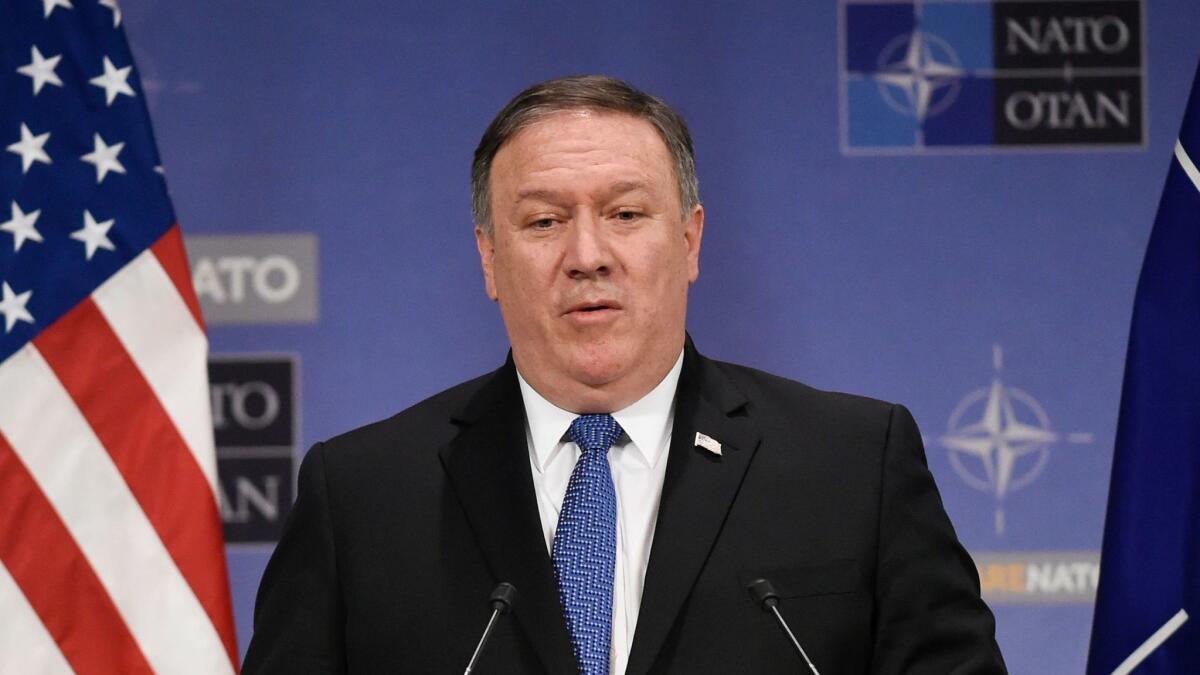As Pompeo kicks off Mideast trip, Iran pushes back against demands for changes to nuclear deal

- Share via
Reporting from Beirut — Iran pushed back Saturday against demands by the Trump administration for changes to the country’s nuclear deal, a subject expected to be high on the agenda as Secretary of State Mike Pompeo met with his Saudi Arabian counterpart at the start of the Middle Eastern leg of his maiden trip as America’s top diplomat.
President Trump has said he will decide by May 12 whether to pull out of the landmark accord and reimpose U.S. sanctions that were lifted after Iran agreed to restrict its nuclear program in 2015.
Speaking on the sidelines of a North Atlantic Treaty Organization summit in Brussels Friday, Pompeo said Trump was unlikely to stay in the deal unless European leaders negotiate a “substantial fix.”
Iranian Foreign Minister Mohammad Javad Zarif, who was in Moscow Saturday for talks about the conflict in Syria, accused the Trump administration of reneging on its obligations, saying demands for changes to the deal signed by the U.S. and five other world powers were “unacceptable.”
Kremlin spokesman Dmitry Peskov also emphasized the “inviolability” of the deal. “Otherwise, there will be no platform for continuing contacts and for continuing the dialogue,” he told reporters Saturday.
French President Emmanuel Macron and German Chancellor Angela Merkel both used trips to Washington this week to lobby Trump not to walk away from the agreement, which they fear could encourage Iran to resume its nuclear program.
But Trump has decried what he sees as “terrible flaws” in the accord, including that it does not address Iran’s ballistic missile program or its support for militant groups elsewhere in the Middle East.
Shortly before Pompeo arrived Saturday in the Saudi capital, Riyadh, Iran-backed rebels in Yemen fired eight ballistic missiles at the southern Saudi city of Jizan. Saudi authorities, who are engaged in a deadly war against the Houthi rebels, said the kingdom’s air defenses intercepted four of the missiles. But they said shrapnel from the attack killed a civilian and damaged two homes.
Senior officials traveling with Pompeo accused Iran of supplying the munitions and said he would use the trip to press for more sanctions on individuals, businesses and government agencies associated with Iran’s missile program.
He will have a receptive ear in Saudi Arabia, where officials have grown increasingly alarmed about the presence of Iranian troops and allied militias in countries such as Syria, Iraq and Yemen. The kingdom has been a staunch opponent of the Iran nuclear deal.
Saudi Foreign Minister Adel Jubeir was on the tarmac to welcome Pompeo to Riyadh on Saturday evening. The secretary was also expected to meet with King Salman and Crown Prince Mohammed bin Salman before traveling to Israel and Jordan on Sunday.
U.S. officials told reporters that Pompeo would seek to reassure Saudi leaders of the United States’ commitment to defend its allies in the Middle East.
He also plans to raise the administration’s concerns about a dispute within the Gulf Cooperation Council that the officials said is hampering attempts to forge a unified response to Iran’s expanding influence in the region. Last summer, Saudi Arabia, the United Arab Emirates and Bahrain, along with Egypt, imposed an embargo on Qatar over its close ties with Iran and alleged support for extremist groups, an accusation Qatar has repeatedly denied.
And the officials said Pompeo would press the Saudis to contribute more to efforts to stabilize areas in eastern Syria that were recently freed from the extremist group Islamic State.
The administration has been struggling to persuade its regional allies to send military troops or contribute funds to the effort, an obstacle that could delay Trump’s goal of pulling American forces out of Syria. The countries are worried about becoming entangled in Syria’s multi-sided civil war and don’t want to be left with the task of preventing an Islamic State resurgence without U.S. backup.
Twitter: @alexzavis
UPDATES:
4:15 p.m.: This article was updated with staff reporting, including details about Pompeo’s upcoming talks in Saudi Arabia and Iran’s response to U.S. demands for changes to the nuclear deal.
5:20 p.m.: This article was updated with background about Saudi Arabia’s dispute with Qatar.
This article was originally published at 11:25 a.m.
More to Read
Sign up for Essential California
The most important California stories and recommendations in your inbox every morning.
You may occasionally receive promotional content from the Los Angeles Times.














